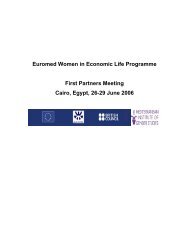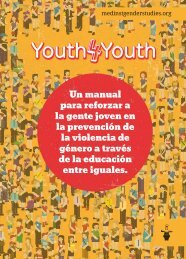react to domestic violence
react to domestic violence
react to domestic violence
You also want an ePaper? Increase the reach of your titles
YUMPU automatically turns print PDFs into web optimized ePapers that Google loves.
Building a Support System for Victims of Domestic Violence<br />
of the family by another member of the family and includes <strong>violence</strong> used for the purpose of having sexual<br />
intercourse without the consent of the victim as well as of restricting its freedom.” 4 Member of the family,<br />
according <strong>to</strong> the Law, can mean a husband and wife who have been legally married whether the marriage<br />
still exists or not, or cohabiting partners; the parents of the cohabiting spouses; the children and/or grandchildren<br />
of cohabiting partners and their parents; or any person residing with the aforementioned persons.<br />
The defilement or attempted defilement of girls under the age of 16, are considered particularly serious and<br />
carry increased sentences. The Law also specifically recognizes children witness of <strong>violence</strong> as direct victims<br />
of said <strong>violence</strong>. Furthermore, marital rape is recognized in the law as a gender-specific offence by a husband<br />
<strong>to</strong>ward his wife.<br />
The Cyprus law on <strong>domestic</strong> <strong>violence</strong> has been widely assessed <strong>to</strong> be adequate and its broad scope has been<br />
cited as an example of best practice. However, the ‘family <strong>violence</strong>’ framework has been widely criticized by<br />
experts on <strong>violence</strong> against women as this results in public policies that aim <strong>to</strong> combat <strong>domestic</strong> <strong>violence</strong> from<br />
a gender blind perspective, without consideration of the gendered power relations at stake in <strong>violence</strong> against<br />
women. Furthermore, it has been argued that not only is gender-neutral legislation subject <strong>to</strong> manipulation by<br />
violent offenders, but it has also serviced <strong>to</strong> prioritize the stability of the family over the rights of the (predominantly<br />
female) complainant/ survivor, because it does not specifically reflect or address women’s experiences<br />
of <strong>violence</strong> perpetrated against them. 5 Thus, gender-neutral legislation fails <strong>to</strong> recognise the differences and<br />
specific needs of women and men, does not acknowledge that women’s and men’s experiences of <strong>violence</strong><br />
differ, nor does it identify such <strong>violence</strong> as a manifestation of his<strong>to</strong>rically unequal power relations between<br />
men and women. 6<br />
As a consequence of this gender-blind approach, as this report will reveal, all policies and measures <strong>to</strong> combat<br />
<strong>domestic</strong> <strong>violence</strong> adopted in Cyprus have failed <strong>to</strong> address the root causes of such <strong>violence</strong> on the one hand,<br />
and have failed <strong>to</strong> meet the specific needs of women victims of <strong>violence</strong> and their children on the other.<br />
2.2 Main Features and Recent Trends in Domestic Violence<br />
National data on the prevalence of <strong>domestic</strong> <strong>violence</strong> is scarce and the only data available are those collected<br />
by the Cyprus Police and the Association for the Prevention and Handling of Violence in the Family, an NGO<br />
that runs a <strong>domestic</strong> <strong>violence</strong> hotline and a women’s shelter. Population based surveys on the prevalence as<br />
well as the effects of all forms of <strong>violence</strong> against women are non-existent and questions on <strong>violence</strong> against<br />
women are not included in other national surveys such as those on health, well-being and quality of life.<br />
Police statistics make it possible <strong>to</strong> describe the trend in reported cases of <strong>domestic</strong> <strong>violence</strong> but do not give a<br />
true picture of the prevalence of <strong>domestic</strong> <strong>violence</strong> in Cyprus. For this reason, the records of the Association for<br />
the Prevention and Handling of Violence in the Family are particularly useful, as will be seen below.<br />
The Advisory Committee for the Prevention and Combating of Violence in the Family, a coordinating body<br />
for the moni<strong>to</strong>ring of <strong>violence</strong> in the family has for some years now been coordinating efforts <strong>to</strong> create a unified<br />
database under the Law Services of the Republic <strong>to</strong> which all front-line services such as the Social Welfare<br />
Services, the Health Services, and the Police will contribute under the principle of “manda<strong>to</strong>ry reporting”.<br />
However, developments have been slow and it is not clear when the database will be fully functional.<br />
The establishment of the database has been included in the recently published National Action Plan on the<br />
Prevention and Combating of Violence in the Family (2010-2015), although no timeline for this has been<br />
4 The Violence in the Family (Prevention and Protection of Victims) Law 119(I) of 2000 and 212(I) of 2004.<br />
5 United Nations Division for the Advancement of Women (2008) Good Practices in Legislation on Violence against Women, Report of<br />
the Expert Group Meeting, 26-28 May 2008, p. 16.<br />
6 United Nations Division for the Advancement of Women (2008) Good Practices in Legislation on Violence against Women, Report of<br />
the Expert Group Meeting, 26-28 May 2008, p. 15.<br />
3







